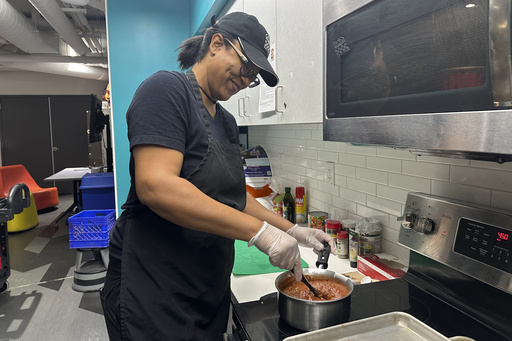
On a recent Tuesday, a man approached nurse practitioner Carolyn McCarthy expressing discomfort in his joints. He mentioned that he had stopped taking his blood pressure medication, a calcium channel blocker, because he mistakenly believed his bones required calcium to remain strong. McCarthy took the time to explain in clear, relatable terms how the medication functions and emphasized its importance in his treatment without affecting calcium levels in his bones. “I hope he left with a better understanding,” McCarthy mentioned.
The mobile clinic is part of an array of health initiatives undertaken by libraries across the United States, ranging from rural community libraries to expansive urban libraries. These centers offer a variety of programs including fitness classes, food pantries, cooking lessons, discussions addressing loneliness, mental health, and even provide blood pressure monitors that can be checked out like books. Libraries have become vital public health resources, capitalizing on their reputation for providing reliable information and their unique capacity to reach individuals outside traditional healthcare environments. No insurance, identification, or specific qualifications are needed—everyone is welcome.
Jaime Placht, a health and well-being specialist at the Kansas City Public Library, emphasizes the role libraries play as vital public institutions. The Kansas City library system includes a dedicated social work team, reinforcing its status as a public health space. With Milwaukee and other libraries collaborating in the American Heart Association’s Libraries with Heart initiative, the Kansas City branches have implemented blood pressure stations, which have seen more than 13,000 uses, along with take-home kits that were borrowed nearly 100 times since the program began.
“We have patrons who return stating that their use of the blood pressure monitor led them to visit their physician for the first time in a significant period,” Placht elaborated. In Jarrell, Texas, a small town lacking a local public health office, the nonprofit library has bridged the gap by providing access to mental health resources. Funded by the philanthropic St. David’s Foundation, it serves as a crucial outlet for the community. The Jarrell Community Library and Resource Center fosters open discussions on topics like end-of-life planning, highlighted by an instance where seniors engaged in a game transitioned their conversation to this sensitive subject, prompting local experts to provide valuable information.
Susan Gregurek, the library’s director, explained that issues discussed encompass broader themes beyond just mental health. Similarly, in Smithville, Texas, the library, which also benefits from the Libraries for Health program, offers surplus food from local farmers and facilitates programs to combat social isolation among teens and older adults. The library’s peer support specialist has experienced a significant surge in community engagement, assisting nearly 60 individuals monthly, up from just 4-5.
With over $3 million invested in enhancing library health programs over the last three years, Smithville’s library director, Judy Bergeron, addresses criticism regarding the funding situation: “It’s crucial, especially when people say, ‘Why invest so much in the library? Nobody reads anymore.’” Operating in Milwaukee libraries for a year and a half, the mobile health clinic averages eight patrons per visit. According to McCarthy, some have returned to share their experiences of receiving life-saving treatments after visiting the hospital, although there were also regrettable instances of individuals who didn’t seek help in time and passed away.
“This service is just a temporary fix in a flawed healthcare system,” McCarthy remarked. Another initiative in Milwaukee focuses on teaching healthy cooking habits to children at the Mitchell Street library, led by chef Sharrie Agee since 2022. She noted that many neighborhoods in Milwaukee lack access to healthy food sources and the knowledge necessary to prepare nutritious meals.
During a recent after-school program, junior chefs assisted Agee in making pizza, demonstrating their growing culinary skills while learning about the origins of the dish and the ingredients. Ruby Herrera brought her children to encourage them to explore healthy cooking practices. Her eldest uses an air fryer for meal preparation. Seven-year-old Yareni Orduna-Herrera proudly completed her task of slicing tomatoes and expressed her eagerness to recreate the pizza at home, signaling a growing interest in various dishes. “The one that I made,” she beamed, eager to share her culinary creation.
